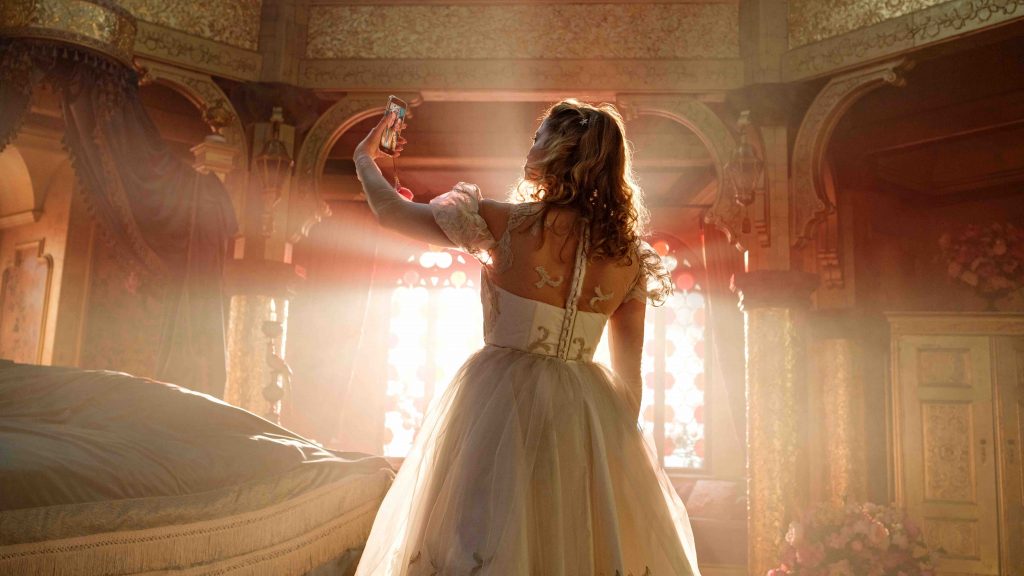„Fack Ju Göhte“ spin off, in which Chantal and her best friend Zeynep are whisked away to the world of fairy tales by a magic mirror.
FAST FACTS:
• Spin-off film of the „Fack Ju Göhte“ films
• Event comedy with many German stars, led by Jella Haase
• Sixth feature film by Bora Dagtekin, the most successful German filmmaker of the last 15 years
• His previous works attracted 29 million fans to the cinemas
• Biggest German blockbuster in the first half of the year
• 8.9 million views for the official trailer on youTube
CREDITS:
Country/Year: Germany 2023; Running Time: 123 minutes; Director & Screenplay: Bora Dagtekin; Cast: Jella Haase, Gizem Emre, Max von der Groeben, Mido Kotaini, Nora Tschirner, Maria Ehrich, Frederick Lau, Alexandra Maria Lara; Distributed by: Constantin; Release: March 28, 2024
REVIEW:
You came for Zeki Müller. You left as a fan of Chantal and her best friend Zeynep (and still thought Zeki Müller was great). More than seven years after „Fack Ju Göhte 3“, the conclusion of the successful saga that sold more than 21 million tickets in German cinemas, Bora Dagtekin has now given the series‘ declared favorite character her own film, produced by him and Lena Schömann. Having recently taken on an increasingly central role in the „Göhte“ films, Chantal now takes center stage for the full running time of „Chantal im Märchenland“ – a whopping 123 minutes – which gives Jella Haase the opportunity to deliver all the social media-speak oneliners that have earned her a permanent place in German-language pop culture for more than ten years, more or less without interruption. All the „cringes“ and „hart“ and meme-worthy observations of her little world, which revolve entirely around Insta, likes, BFFs, „GNTM“, drugstores and, of course, her cell phone, are enough to make you dizzy.

But that has always been the intrinsic quality of Bora Dagtekin’s dialogue: they are so in tune with the times that the young (and now probably somewhat older) target group can identify with them completely. At first you laugh at Chantal, the brash girl from Neuperlach – or as they used to say in Munich for many years: Neuprolach – who seemed a bit like Vicky Pollard from the British sketch series „Little Britain“ or Kelly Bundy from „Married… with Children“, but a) is nowhere near as crude and crass as the former and b) is never as hollow as the latter, and is played by Jella Haase in a disarming and utterly unique way that makes all comparisons superfluous. The better you get to know her, the more you laugh with her: at first glance, Chantal may seem to give in to all the given clichés and stereotypes you might expect, but Dagtekin and Haase have created and played her so cleverly that, as a viewer, you only get a demonstration of your own privilege if you label her prematurely. It’s no coincidence that Chantal’s surname is „Ackermann“ – a tongue-in-cheek reference to Belgian feminist filmmaker Chantal Akerman, whose experimental film “ Jeanne Dielman, 23 quai du Commerce, 1080 Bruxelles“ was voted the best film of all time by film critics and filmmakers in the latest Sight & Sound poll in 2022.
It may seem absurd to mention „Chantal im Märchenland“ and „Jeanne Dielman“ side by side in a film review. But Dagtekin’s film is also a portrait of women as well as a debunking of patriarchal power structures, to put it pompously, a plea against toxic masculinity and broad-leggedness, for self-determination and the empowerment of women. In contrast to „Jeanne Dielman“, however, the admittedly rather heavy handed message of „Chantal im Märchenland“ will be seen by more people than just the Criterion Collection fan club on X (formerly known as Twitter). Now, it may not be the height of originality to want to shake up the fairytale world of princesses and all its pitfalls, especially after Disney had already done this so pointedly and ingeniously in „Wreck-It-Ralph 2“. But it doesn’t hurt to take Chantal and Zeynep out of their universe in the east of Munich and let them dive into the primordial soup of German culture through a magic mirror. It’s a colorful and lively romp as Bora Dagtekin lets his heroines cross the path of silly knights, overburdened princes and a blasé youthful king, find true solidarity among witches, of all people, confront dragons and finally declare war on the pompous world of men.
The film looks a bit as if Jella Haase and Gizem Emre are whirling through the sets of a „Shrek“ movie. But the buildings, costumes and many visual effects are just extras to spice up the experience: which simply revels in the considerable female power of the two heroines, who can only survive this adventure as best friends and learn a bit about themselves and their lives in the process, while the players in the fairytale world are plunged into deep identity crises: The prince can’t live up to expectations, Aladdin’s carpet can’t fly, strong women are banished to paintings as punishment. It is up to Chantal and Zeynep to change this, and to take the audience with them. Among the many guest stars who pop in, including Max von der Groeben with a character that is the exact opposite of his Danger character from the „Fack Ju Göhte“ films, as well as Maria Ehrich, Alexandra Maria Lara, Frederick Lau, Jasmin Tabatabai and, for a fraction of a minute or two, Elyas M’Barek in a guest appearance, is Nora Tschirner as Earth Mother Sansara. One really would have liked to have seen more of her. Chantal doesn’t have to save the movie theaters after saving the fairytale world. She could, however, sell a few million movie tickets. 29 million admissions for Bora Dagtekin’s films to date are far from enough.
Thomas Schultze
